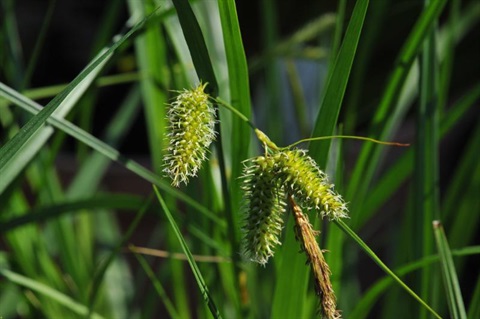
Carex longebrachiata
Bergalia Tussock
Densely tufted perennial sedge spreading from a short underground stem. Flowering stem upright to 80cm, round to triangular in cross section to 1.3mm diam, smooth to rough.
Additional information
- FamilyCyperaceae
- StoreyLower storey
- Size0.4-1 m high
- Plant groupingGrasses, Rushes & Sedges
- LeavesLeaves stiff, longer than flowering stems, 2-4 mm wide. Sheath pale yellow-brown. Lowest leafy bract at base of flowerhead shorter than flowerhead.
- Flower colourYellow-brown to red-brown
- Flowering timeSpring to summer
- FlowersDrooping flowerhead 40-90 cm long, 1-8 spikes per node on long drooping stalks, densely flowered above, loose below; upper spike female with long male section below; lower spikes female above short male section. Fruit narrow. Nut yellow-brown.
- Bird attractingNo
- Butterfly attractingNo
- Frog habitatYes
- Growing conditionsMoist soil in low-lying woodlands. Semi shade.
- Garden useMoist gardens by water areas.
- Commercially availableNever
- Conservation statusSignificant within the Shire. Known from a couple of sites in the Yering area, possibly no longer existing there.
- Related speciesVery similar to Carex iynx. Distinguish by the stiffer leaves, paler leaf sheaths and the female flowers above male flowers, especially in the terminal spike. Leaves M-shaped in cross-section (cf. V-shaped in C. iynx).
Photo Gallery
Photographer/s: Rob Wiltshire, © Threatened Species Section (2019), Department of Primary Industries, Parks, Water and Environment, Tasmania
Plant Communities